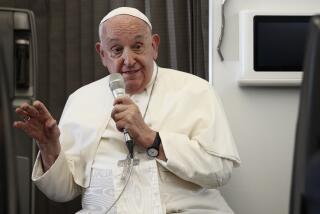Pope Backs Organ Donation but Not Cell Cloning
ROME — Pope John Paul II endorsed voluntary organ donation Tuesday as “a genuine act of love” but condemned the cloning of human cells to make lifesaving transplants.
The Roman Catholic leader, addressing 4,000 transplant specialists in his first full speech on the subject, spelled out moral guidelines for the quickly advancing science of transplant therapy.
While the speech ratified previous Vatican views, his timing and choice of audience underlined John Paul’s concern about recent government decisions in the United States and Britain favoring therapeutic use of human embryos.
The 80-year-old pontiff left his summer retreat at Castel Gandolfo outside Rome to speak at the international meeting of the Transplantation Society, which had invited him to help boost its cause.
John Paul did not disappoint. Calling transplants a “great step forward in science’s service to man,” he urged political leaders and educators to join in promoting organ donation as a noble, self-sacrificing gesture.
“There is a need to instill in people’s hearts, especially in the hearts of the young generation, a genuine and deep appreciation of the need for brotherly love, a love that can find expression in the decision to become an organ donor,” he said.
The pope followed with a point-by-point summary of the Vatican’s conditions for morally acceptable donation and transplant procedures.
He condemned the sale of organs and insisted on informed consent on both sides of the process. Vital organs should be removed from a donor only after death, he said, which could be defined as “the complete and irreversible cessation” of brain activity.
Priority for receiving transplanted hearts, kidneys, livers and other organs should be based only on “immunological and clinical factors,” he added, not on age, sex, race, religion, social standing or one’s usefulness to society.
While most Western scientists and policymakers accept such conditions, recent advances in cloning and stem cell research have opened a breach between science and religion.
Stem cells have the power to grow into almost any tissue or cell in the body. Britain’s chief medical officer recommended this month that scientists be allowed to clone human embryos to obtain stem cells that could, for example, grow into new brain cells for Alzheimer’s patients or new pancreas cells for diabetics.
Last Wednesday, the U.S. government announced that it will start funding stem cell research on “excess” frozen embryos created for fertility treatment. President Clinton said the research offers “breathtaking” promise and could save lives.
Catholic leaders and antiabortion groups, holding that life begins at conception, have objected to both governments’ decisions on the ground that taking stem cells from a human embryo destroys it.
In his speech Tuesday, John Paul said that techniques involving the manipulation or destruction of human embryos “are not morally acceptable, even when their proposed goal is good in itself.”
He said the Vatican is open to therapies that would make use of stem cells taken safely from consenting adults.
“This is the direction that research must follow if it wishes to respect the dignity of each and every human being,” he said, adding that theologians should monitor that research and help scientists clarify moral issues.
Moral concerns have divided researchers at the scientific conference and, conspicuously, the host government. Italian Health Minister Umberto Veronesi came out last week for research on human cloning, only to be opposed Tuesday by his top undersecretary.
“The general consensus in Europe is that experimenting with the embryo is unethical, but that attitude is breaking down as we see the possibilities for saving lives,” said Dagfinn Albrechtsen, a transplant surgeon from Oslo.
“New techniques seem to indicate that you really need those very early embryonic cells to do what was not possible before,” he added. “On the other hand, we’re learning that stem cells from adults might be suitably primitive, so maybe we don’t need the embryos. We don’t really know. We need more research.”
Dr. Oscar Salvatierra Jr., president of the Transplantation Society, said after listening to the pope that the worldwide group does not contemplate the use of embryonic stem cells but that its ethics committee is considering their potential. “We cannot put blinders on,” he said.






